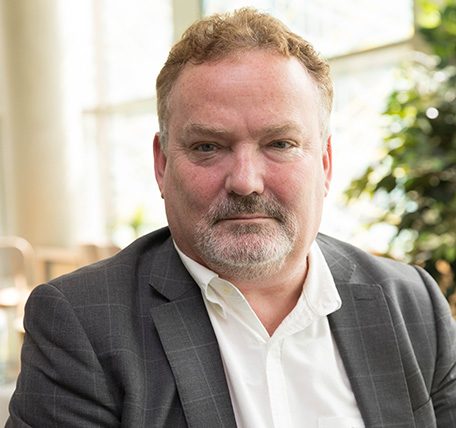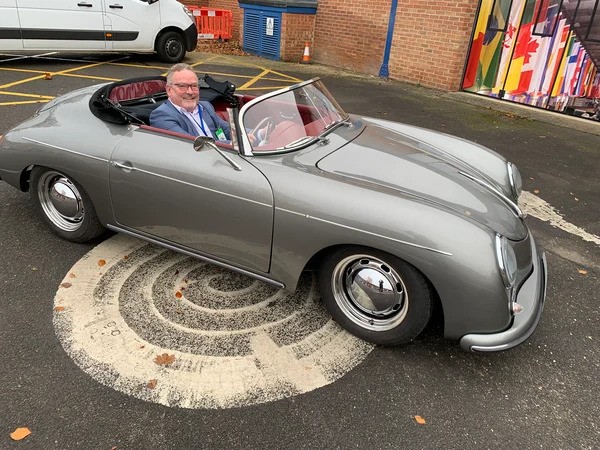
Interview with Phil Blythe, Professor of Intelligent Transport Systems at Newcastle University
Phil Blythe, Professor of Intelligent Transport Systems at Newcastle University, heads up the new Research Hub for Decarbonised Adaptable and Resilient Transport Infrastructures (DARe). He spoke to Andy Walker for Climate Perspectives about how the hub is developing solutions for delivering a resilient, net zero transport system.
The government-backed Research Hub for Decarbonised Adaptable and Resilient Transport Infrastructures (DARe) is helping to upgrade and decarbonise the UK’s national, regional and local transport system and is funded jointly by research and innovation body UKRI and the Department for Transport. “It’s really an attempt to bring together two areas of transportation that haven’t really been linked that much in the past – decarbonisation and moving our transport systems and networks towards net zero and also looking at the adaptability and resilience of that transport infrastructure so it can continue to operate as the effects of extreme weather through climate change kick in,” says Phil Blythe who leads the initiative.
“We are trying to bring a ‘systems of systems’ approach to understand all aspects and bring a bunch of models together. It’s led by Newcastle University but also includes Cambridge University as a major partner and also Glasgow University and Herriot Watt. We are trying to understand the challenges of where we are now towards decarbonisation but also ensuring that our transport networks remain resilient in the face of climate change,” says Blythe.
According to Blythe, transport has never really been high on the political agenda and this needs to change. “If we don’t get an effective transport network for people going to work and moving the economy forward then society could fall to bits very quickly,” he says.

The Department for Transport published its decarbonisation strategy in 2021, which included a lot of work on electromobility, recognising that transport is responsible for 30% of all emissions and of that well over 80% is from road transport. “The low hanging fruit to make a difference quickly has been dealing with the decarbonisation of road transport and the transition towards electric vehicles,” explains Blythe. “From the resilience point of view, if we are putting more of our eggs for transportation in the electric basket, then if we have problems with the resilience of the electricity network then we have massive problems with the resilience of the transport network, so we are trying to understand all this in the round in the work of DARe,” he said.
It’s not only technology and replacing one form of energy and fuel for transport by another where the solution to decarbonisation lies, says Blythe. “A lot of this is behavioural and getting people to think about doing things differently, as individuals, as society, as business, as government and as a nation. That’s what I think we are really missing when addressing the decarbonisation challenge,” he says.
Blythe would like to see London-style public transport rolled out across the country to encourage the behaviour change that’s needed to make a difference. “We don’t have enough alternatives to using the car to enable people to switch to other modes. If you think about London which has a fantastic integrated transport system, unless you have a very good reason, you wouldn’t bring a car or a van into London. We don’t have similar systems with similar levels of frequency in the rest of the country and until we do that it’s really hard to push people out of cars,” he says.
Adaptation also needs to be considered according to Blythe. “Adaptation is really critical and we haven’t looked at it enough in the UK. How do we make existing transport systems more resilient and decarbonised? That may mean different maintenance mechanisms, using intelligent solutions and data to drive updates and changes – we need to think differently. We also need to look at how we keep our current infrastructure running for longer. Being aware of where the ‘hot points’ are in the infrastructure, so use of data is important,” says Blythe.
“We hope to gather the evidence and create the models to enable people to make decisions on what needs to be done now and into the future. I’m hoping that our hub will provide some of the evidence for the investment that is needed. We need to understand better what the climate extremes are and that’s why we have partners involved in our work like Network Rail, National Highways, lots of local authorities and regional bodies who have their own unique challenges, so we need to bring all that to bear and see what can be scaled up and used elsewhere,” he says.
Blythe says that DARe will bring in all the expertise from its many stakeholders to act as a “one-stop shop for discussion and action” on this important issue. “We are also committed to creating models and the outputs we create will be open source and available to all – we will bring together stakeholders and the best of the UK to develop a national view,” says Blythe.
Like many who work in this sector, Blythe is passionate about tackling climate change and feels its impact personally. “As I child I lived in a council house in Durham and every winter we had fantastic snow and we used to go to a hill near us and sledge for three months of the year. Since my kids were born – they are both in their mid-20s now – snow is almost a treat and they have only seen it perhaps a few times in their young lives and it just highlights the changes in the climate in that time,” he says.
Despite the danger that the government may backtrack on its decarbonisation commitments in the face of economic challenges, Blythe retains an optimism that real change can be achieved. “Climate change is an existential threat to the country and has to be an absolute priority and we have to keep the faith. We have the opportunity in this country to be a leader on this and we need to look at where we can make a difference now and export those ideas elsewhere,” says Blythe.
“I’ve always been an optimist and an enthusiast about making things better. If government still provides leadership so people know what they are investing their time and their money into is actually going to be meaningful and can actually deliver I think we can go a long way into mitigating the effects of climate change. I’m optimistic we can do a lot,” he says.